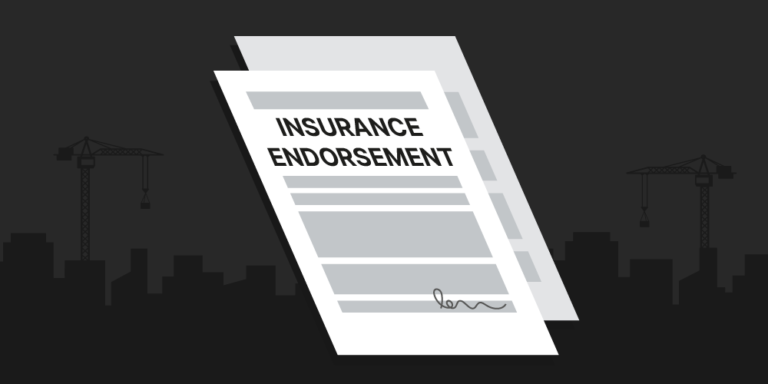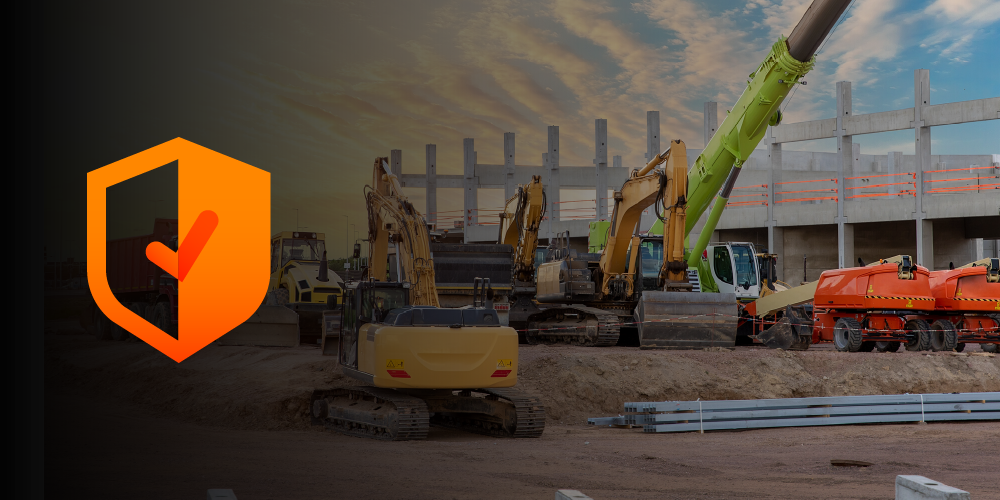— 6 min read
What Is an Insurance Endorsement? A Contractor’s Guide
Last Updated Jun 18, 2024
Last Updated Jun 18, 2024

When working in construction, your insurance policy gets issued as a fairly standard contract. At the core, you have property coverage for your tools and equipment, along with a liability component that protects your financial assets in case there’s a work-related accident or injury for which you may have some responsibility.
Like a basic construction agreement, you can upgrade or downgrade your insurance policy just as a customer might do with the fit and finish of a building. This kind of policy enhancement typically comes in the form of an insurance endorsement, which gives your business some more comprehensive insurance coverage — or strips coverage away — per your request. Let's take a look at what insurance endorsements are, how they work, and some common examples.
Table of contents
What is an insurance endorsement?
An insurance endorsement is an amendment to your base business insurance policy. An endorsement — also known as an insurance rider — adds, deletes, or changes your insurance coverage.
An endorsement materially changes the contract, so you’ll typically receive an update from your insurance carrier when you add one. The amendment will provide detailed information on the endorsement along with a separate notice of how much the change in coverage might cost.
Endorsements that enhance your contractor’s policy add premium to your annual bill. But you can also remove or have coverages excluded from the policy, which would likely decrease in cost with less comprehensive coverage.
How insurance endorsements work
The process of triggering an insurance endorsement works fairly simply. If you discover a business need during the course of the policy year, you can check with a broker or agent to see if additional coverage is available to address the exposure.
You might uncover that need as the result of a periodic contractor’s insurance review with an insurance representative, or just during your daily operations.
Being able to add or remove coverage is one of the benefits of insurance endorsements. You don’t have to wait for the policy’s renewal date to make changes. Once you discover that you must modify the terms of the contractor’s policy, you can simply notify an agent or broker to initiate the addition or delegation of an endorsement. A copy of the endorsement’s addition or removal will be generated and attached to your original policy documents.
It’s important to note that once such a change is made to your business insurance, it’s not set in stone. If at some point you discover that you need to add coverage back or delete the protection, you can simply start the endorsement process over again, reversing the decision to secure or eliminate said coverage at any time.
What do insurance endorsements cover?
Insurance endorsements give you the ability to customize a business insurance policy according to your specific needs. In other words, an insurance endorsement allows you to amend your coverage to fit your situation.
In addition to a new business need you discover requires coverage, an endorsement may need to be added due to contract requirements created by a third party. One of the most common forms of insurance endorsement in construction is adding additional parties to coverage.
For example, the construction agreement created by owners and/or lenders may require you to name project architects as additional insureds on the policy. This request results in those parties receiving some or all of the liability protection on your contractor's policy.
The opposite may also hold true. Let's look at another example: While reviewing coverages on your policy, you discover that there is a waiver of subrogation endorsement. This amendment boosts the annual policy premium and prevents your insurance company from recovering financial damages from the insurance carrier of a subcontractor.
Let's say in this example, you have a dedicated team of employees who perform all duties, and you do not hire subcontractors. You can then delete the waiver from your coverage — and later, another endorsement can allow you to add it again if at some point in the future you do decide to work with subs.
5 common types of insurance endorsements
In most cases, you’ll be looking to add coverage when an individual project warrants the endorsement. Here are five common policy endorsements that you can add to a business policy as needed:
1. Prior acts
It’s prudent to look back and realize that potential liability doesn’t end when the project is completed. There could be repair or design issues that creep up years after a structure has been built and inhabited. In that case, the owners could legally seek damages from your company. A prior acts endorsement, as the name suggests, offers liability for such situations even if they occurred before you purchased the policy.
2. Products and completed operations
Just as you look at exposures from your past work, you must also plan for future risks. A product and completed operations endorsement can be added to your policy so that liability coverage extends beyond the project’s completion. This endorsement locks in coverage with your current carrier and applies to jobs you will have completed during the policy period.
3. Equipment breakdown
A sudden equipment failure on your project site could dent your bottom line. An equipment breakdown endorsement offers you the ability to repair, replace, or temporarily rent said equipment so that you can fulfill your contractual duties and preserve your profits.
4. Electronic data processing
If you use computers or mobile devices to record material purchases, track employee payroll/activity, or book payments from lenders or owners, it’s more than likely that you use software to stay organized with bookkeeping and accounting. A data breach or outage could cause all that information to be lost, requiring considerable time and expense to piece all your financials back together. An EDP endorsement helps cover the cost of these efforts.
5. Pollution liability with site cleanup
A spill or leakage of oil, gas, or other contaminants on the job can have a considerable rippling financial effect if your organization is held wholly or partially liable for the mishap. A pollution liability endorsement covers such an occurrence, and the amendment can be secured with or without an option to help defray the expense of site cleanup.
Insurance endorsements keep a policy flexible
Insurance is an essential part of managing risk for your construction business, and making sure all your bases are covered is crucial. The advantage of insurance endorsements is allowing your policy to stay flexible.
You can design a business insurance program suited to your needs while cutting away some coverages you won’t require — and perhaps trimming a few dollars from overhead.
Was this article helpful?
Thank you for your submission.
100%
0%
You voted that this article was . Was this a mistake? If so, change your vote here.
Scroll less, learn more about construction.
Subscribe to The Blueprint, Procore’s construction newsletter, to get content from industry experts delivered straight to your inbox.
By clicking this button, you agree to our Privacy Notice and Terms of Service.
Categories:
Tags:
Written by
Thomas Tracy
13 articles
Thom is a group benefits consultant with over 25 years of experience as an insurance and financial advisor. He has written for Quickbooks, tED Magazine, Investopedia, the National Bank of Arizona, and others.
View profileExplore more helpful resources

What is Equipment Floater Insurance for Contractors?
Most contractors rely on tools and equipment to complete construction projects. But if something happens to those items, they can be expensive to replace. Contractors can benefit from purchasing an...

Construction Equipment Rental Insurance: How & Where to Get Coverage
Contractors and construction businesses that rent equipment should consider getting construction equipment rental insurance. This type of insurance covers the cost of replacing rented tools and equipment if they get...

Understanding Construction Insurance: Actuarial vs. Underwriting Factors
Determining the price of construction insurance is complex, with much of the work happening behind the scenes. Most construction companies interact primarily with an insurance broker or agent, but actuaries...

Construction Insurance Pricing: What Determines the Cost of Insurance?
Construction is a risky and litigious business, and insurance can help mitigate the risks for builders and owners. Construction insurance is a valuable and frequently required tool, so understanding how...